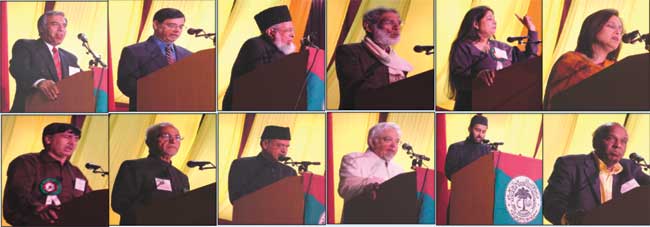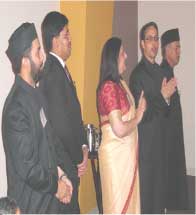San Francisco Bay Area’s
Tribute to Sir Syed
By Ras H. Siddiqui
 Speakers
and poets who participated in the Sir Syed Day Banquet
and International Mushaira organized by AMU Alumni
Association of Northern California
Speakers
and poets who participated in the Sir Syed Day Banquet
and International Mushaira organized by AMU Alumni
Association of Northern California |
Keeping up with a tradition
is difficult. But the Alma Mater with which the AMU community
is connected to is indeed unique. Located in Northern India,
Aligarh Muslim University (AMU) is over 150 years old and
its numerous Alumni groups today transcend geographical
boundaries. The San Francisco Bay Area is no exception and
is proud of one such group as the AMU Alumni Association
of Northern California (www.amualumni.org) stays soaked
in its traditions. Its annual Sir Syed Day Banquet and International
Mushaira held this year in Milpitas, California on November
17th was once again testimony to not only the individual
successes of its alumni but a reflection of their classy
educational origins as well.
From amongst its better known alumni Dr. Zakir Husain (former
President of India), Ayub Khan (former President of Pakistan),
writers Ali Sardar Jafri, Asrar-ul Haq Majaz, Shakeel Badayuni,
Asmat Chugtai along with the ever popular Jawed Akhtar and
Naseeruddin Shah stand out. Naseeruddin’s role in
the movie Khuda Kay Liye (just opened in North America)
would have made Sir Syed proud.
The gala evening started of with a fine dinner from the
Mughlai realm. The formalities commenced with a recitation
from the Holy Qur’an by Afzal Saeed Khan. Introductions
were made by Aftab Iqbal who also emceed the first half
of the program. He expressed his admiration of Sir Syed,
“Marnay Waalay Martey Hain Fana Hotay Nahin,”
as he expressed thanks to the long departed founder of AMU.
And what a legacy he has left behind, a way of thinking
that Muslims worldwide could benefit from a great deal in
the current era.
AMU Alumni of Northern California President Nihal Khan presented
his welcome address to a now full house. “Once again
we have gathered to pay homage to our founder,” he
said. He reminded everyone that this was the tenth anniversary
of the Association in Northern California and that he did
not wear glasses when he was its President for the first
time. Nihal pointed to the Sir Syed Scholarship program
that has thus far helped over 1200 students. The program
currently supports 140 students and targets over 200 next
year.
The Aligarh Education Endowment Fund serving the needs of
the underprivileged communities in India was also highlighted
(www.aeef.net). The initial contribution to this fund by
Drs. Hasan Kamil and Talat Hasan was appreciated. Nihal
went on to explain that the fund was not exclusive to one
community. He ended his speech with a word of thanks for
all volunteers that made this program possible along with
the guests that evening, many of whom came from far away.
He especially thanked the sponsors the Hasan’s, Mr.
and Mrs. Ashraf Habibullah, Mr. and Mrs. Syed Sarwat, Dr.
and Mrs. Abdul Qayum, Drs. Waheed and Mrs. Munazza Qureshi,
Dr. Karim Hussain, Mr. and Mrs. Zafar Hamdani and Mr. and
Mrs. Shabbir Siddiqui. His quote from the poet Majaz resonated
in the hall as keynote speaker Dr. M. Humayon Qayoumi was
introduced.
 Singing
the Aligarh tarana
Singing
the Aligarh tarana |
Dr. Qayoumi, originally
from Afghanistan, is currently CSU East Bay President and
a well-known area personality. He started his speech with
a quote from Urdu’s greatest poet Mirza Ghalib. Taking
a page from Sir Syed’s rich contributions to our community
over 150 years ago, Dr. Qayoumi brought us back to today.
“How can we make education become a liberating force?”
he asked.
From globalization in the Flat World where benefits are
not evenly distributed with millions facing food, water
and sanitation shortages, the question of humankind as a
whole being better off today remains unanswered. The keynote
speech took the audience on quite a journey. From Maulana
Azad who was also India’s first Education Minister,
back to the Gupta Empire in Indian history, to the Muslim
contributions to the field of medicine, history and science
and rational thinking via Ibne Sina and Al Beruni and India’s
valuable contribution to the world of mathematics, the world
saw the basics established that paved the way for the new
modes of today’s communication (the Internet, You
Tube, etc). Yet, in spite of the improved communication
many people in America could still not point to Iraq and
Afghanistan correctly on the world map and some could not
do the same for the Pacific Ocean!
Dr. Qayoumi said that the plight of the world’s poor
must be remembered and addressed and ignorance has to be
countered through educational outreach (Sir Syed engaged
in this). He ended his keynote with a quote from the great
Bengali poet Tagore.
The first part of the program ended with the traditional
singing of the tarana or anthem of Aligarh Muslim University:
“Yeh mera chaman hai mera chaman, Mein Apnae chaman
ka bulbul hoon…” written by Asrarul Haq Majaz
Luchnawi. The enthusiastic audience this time was aided
by a video presentation during this effort.
The second part of the Sir Syed Day event and a major annual
attraction is the Urdu language mushaira or poetry recital.
This year poets from Pakistan, India, and the United States
took part in this fine tapestry of talent. Abidullah Ghazi
(Chicago) conducted the proceedings starting with his congratulations
on a full house (tickets were sold out a couple of days
before). Mr. Ghazi also commended the local community on
the ICC, a fine facility that it has built.
“Humari Tehzeeb aik Numainda Tehzeeb hai,” said
Ghazi, referring to the cultures represented in Urdu, a
South Asian language enriched by Tukish, Persian and Arabic
from where its poetry derives much inspiration.
And inspiration was not in short supply this evening as
the first round of poetry began with Mahnaz Naqvi presenting
“Mohabbat Kay Safar Mein” and “Mila Na
Mila.” Local software engineer Vasmi Abidi next attacked
the issue of alienation in his verses. Ironically according
to him in the age of global communication, email and the
Internet people do not know their own neighbors. His “Jis
kay Ghar say mila hai mera ghar..” was really moving.
Renowned poetess from Pakistan, Zakia Ghazal, next literally
stole the evening with her “tarannum” singing
style. Zaki’s famous verses on Karachi are getting
a great deal of notice recently. Her first naatia ghazal
“Deta Hai” painted a full picture of events.
I will leave her “Koi Rishtay Nahin to Kiya Haq Hai
Aap ko Faislah Sunanay Ka” to the readers to translate.
ghazal’s poetry etches a painfully clear portrait
of events around her.
“Aik Teri Tamanna Ki Ruswai bhi Dekhain Ge”
was certainly reflective of that quality.
Urdu poetry is not without its humorous tangent. Khamakhah
Hyderabadi (India ) is certainly a true representative of
that craft. “Naik Seerat ho to Soorat Ki zaroorat
Kiya Hai,” (With honest intentions, who needs good
looks?) was one example. Hyderabadi took the audience to
rollicking laughter with his wit and sarcasm. Individual
and collective shortcomings were fair game throughout his
presentation.
After the mushaira President Hanif Akhgar (from Dallas TX
) issued a call for support of the Iqra Foundation and another
guest poet Azam Qasmi was invited on to the stageNext it
was the turn of mushaira conductor Abidullah Ghazi himself
to present his work. “Lut Gayay Dar Badar Ho Gayay,
Kuch Idhar, Kuch Udhar Ho Gayay” spoke of broken connections.
His “Waqt Pe Nazar Rakhna, Yeh Badalta Rehta Hai,
Aaj Meri Baari Hai, Kal Tuhari Hai” referred to changing
political conditions and was very well received.
Guest poet Azam Qasmi next presented his work, some from
the Ghalib Centennial held in India . He was followed by
Akhtar Shumaar (Pakistan) who took everyone on quite a philosophical
path. “Apnay Hi Ghar Mein Mujhay, Ghar ki Talsh thi”
(I was looking for home inside my own house!). His “Karain
Kiya” (What to do?) was also very well received.
Rahat Indori (India) continued along similar lines. He began
by saying:“Is Chotay say Hindustan aur Chotay Say
Pakistan Ko Salaam Karta hoon.” His “Kiyoon
Hai” and “Aur Hai” were very well received.
Presiding over the mushaira, senior poet Hanif Akhgar proved
his level of skill and proceeded to deliver both ghazals
and nazms. “Wajood Mera Kahin Bhi Ho, meri Rooh Meray
Watan Mein Hai,” he said. “Jisay Jalna Nahin
Aata Who Parvana Nahin Hota,” he continued as he took
a memory route and said some beautiful words in memory of
his long departed mother.
In conclusion it was great to once again witness the Aligarh
spirit alive and well in Northern California. The program
started exactly on time and ended just too soon for many
people, including this writer.
-------------------------------------------------------------------------------------

